-
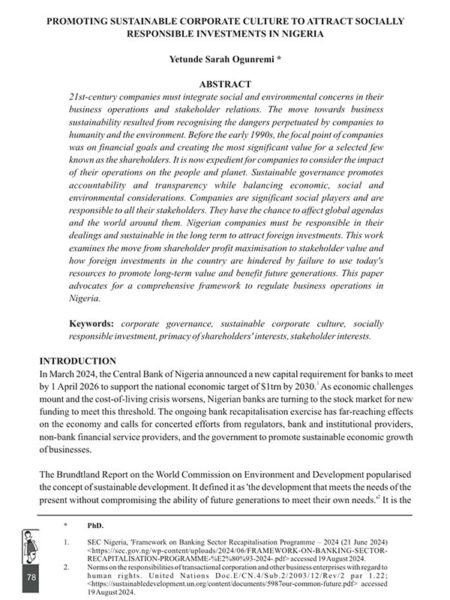
Promoting Sustainable Corporate Culture to Attract Socially Responsible Investments in Nigeria
0₦2,500.00Yetunde Sarah Ogunremi, in her article, Promoting Sustainable Corporate Culture to Attract Socially Responsible Investments in Nigeria, explores the need for companies to integrate social and environmental concerns in their business operations and stakeholder relations. The move towards business sustainability was as a result of the recognition of the dangers perpetuated by companies to humanity and the environment. Prior to the early 1990s, the focal point of companies was on financial goals and creating the greatest value for a selected few known as the shareholders. It is now expedient for companies to consider the impact of their operations on the people and planet. Sustainable governance promotes accountability and transparency while balancing economic, social and environmental considerations. Companies are significant social players and responsible to all their stakeholders. They have the chance to affect global agendas and the world around them. Nigerian companies must be responsible in their dealings and sustainable in the long term in order to attract foreign investments. Ogunremi examines the move from shareholder profit maximization to stakeholder value and how foreign investments in the country are hindered by failure to use resources of today in ways that promote long term value and benefit to future generations. Ogunremi advocates for a comprehensive framework to regulate business operations in Nigeria.
-
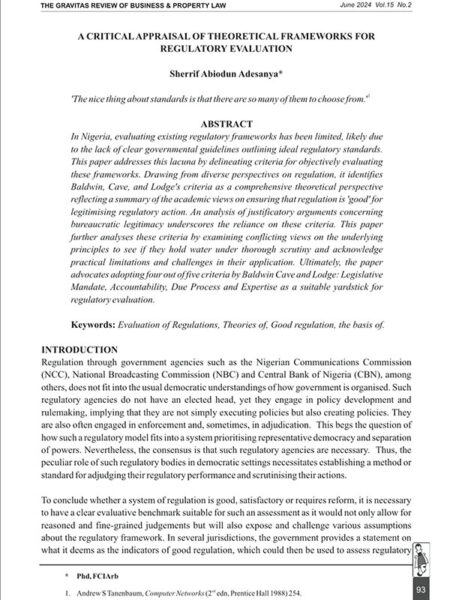
A Critical Appraisal of Theoretical Frameworks for Regulatory Evaluation
0₦2,500.00Sherrif Abiodun Adesanya, in his article, A Critical Appraisal of Theoretical Frameworks for Regulatory Evaluation, posits the need to have a theoretical basis for the evaluation of existing regulatory frameworks. Adesanya provides a set of criteria for the objective evaluation of these frameworks. Drawing from diverse perspectives on regulation, he identifies Baldwin, Cave, and Lodge’s criteria as a comprehensive theoretical perspective reflecting a summary of the academic views on how to ensure that regulation is ‘good’ for the purpose of legitimising regulatory action. An analysis of justificatory arguments concerning bureaucratic legitimacy underscores the reliance on these criteria. Adesanya analyses these criteria further by examining conflicting views on the underlying principles to see if these criteria hold water under thorough scrutiny and acknowledging practical limitations and challenges in their application. Ultimately, Adesanya advocates for the adoption of four out of five criteria put forth by Baldwin Cave and Lodge namely: Legislative Mandate, Accountability, Due Process and Expertise as a suitable yardstick for regulatory evaluation.
-
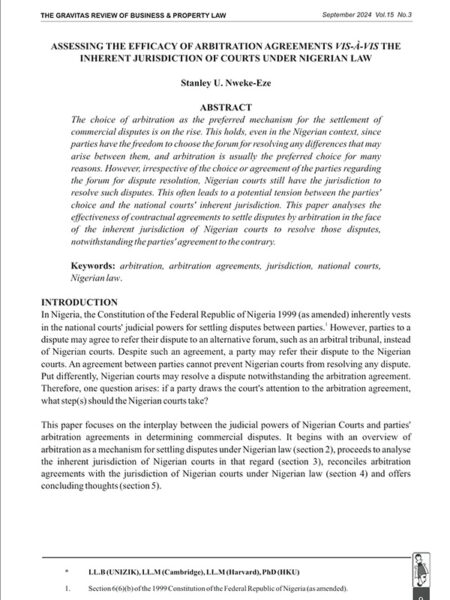
Situating the Efficacy of Arbitration Agreements Vis-à-Vis the Inherent Jurisdiction of National Courts under Nigerian Law
0₦2,500.00Stanley Nweke-Eze, in his article Situating the Efficacy of Arbitration Agreements Vis-à-Vis the Inherent Jurisdiction of National Courts under Nigerian Law, examines the efficacy of Arbitration agreements in the settlement of commercial disputes and the jurisdiction of national courts. The choice of arbitration as the preferred mechanism for the settlement of commercial disputes is on the rise. This holds true, even in the Nigerian context, since parties have the freedom to choose the forum for resolving any differences that may arise between them, and arbitration is usually the preferred choice for a myriad of reasons. However, irrespective of the choice or agreement of the parties regarding the forum for dispute resolution, a party may still invoke the inherent jurisdiction of the Nigerian courts to resolve such disputes. Oftentimes, this leads to a potential tension between the choice of the parties and the inherent jurisdiction of the national courts. Nweke-Eze analyses the effectiveness of contractual agreements to settle disputes by arbitration in the face of the inherent jurisdiction of Nigerian courts to resolve those disputes, notwithstanding the parties’ agreement to the contrary.
-
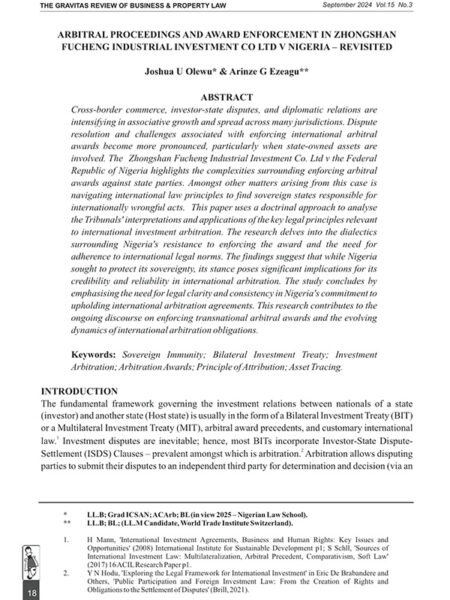
Arbitral Proceedings and Award Enforcement in Zhongshan Fucheng Industrial Investment Co Ltd v Nigeria – Revisited
0₦2,500.00Joshua Olewu and Arinze Ezeagu in their article, Arbitral Proceedings and Award Enforcement in Zhongshan Fucheng Industrial Investment Co Ltd v Nigeria – Revisited, examine jurisdictional issues arising from the enforcement of arbitral award in the celebrated case of Zhongshan Fucheng Industiral investment Co. Ltd v FRN. Cross-border commerce, investor-state disputes, and diplomatic relations are intensifying in associative growth and spread across many jurisdictions. Dispute resolution and challenges associated with enforcing international arbitral awards become more pronounced particularly when state-owned assets are involved. The case of Zhongshan Fucheng Industrial Investment Co. Ltd v Federal Republic of Nigeria highlights the complexities surrounding the enforcement of arbitral awards against state-parties. Amongst other matters arising from this case, is the navigation of international law principles to find sovereign states responsible for internationally wrongful acts. Using a doctrinal approach, Olewu and Ezeagu analyze the Tribunals’ interpretations and applications of the key legal principles relevant to international investment arbitration. The research delves into the dialectics surrounding Nigeria’s resistance to the enforcement of the award and the need for adherence to international legal norms. The findings suggest that while Nigeria sought to protect its sovereignty, its stance poses significant implications for its credibility and reliability in international arbitration. The study concludes by emphasizing the need for legal clarity and consistency in Nigeria’s commitment to upholding international arbitration agreements. This research contributes to the ongoing discourse on the enforcement of transnational arbitral awards and the evolving dynamics of international arbitration obligations.
-
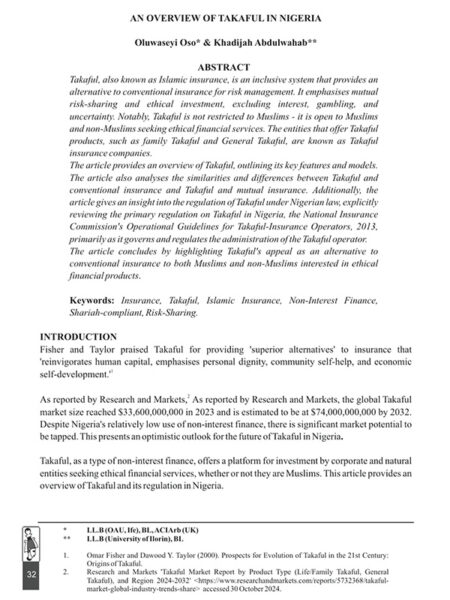
An Overview of Takaful in Nigeria
0₦2,500.00Oluwaseyi Oso and Khadijah Abdulwahab in their article, An Overview of Takaful in Nigeria, introduce our readers to the practice of Takaful, an Islamic insurance practice which provides an alternative to conventional insurance for risk management. Takaful underscores, among others, mutual risk-sharing and ethical investment which excludes prohibited elements such as interest, gambling, and uncertainty. Interestingly, Takaful, though must be Shariah-compliant is not restricted to Muslims – both Muslims and non-Muslims seeking ethical financial services can invest in Takaful products. The Takaful operators are Takaful insurance companies which offer Takaful products such as family Takaful and general Takaful. Oso and Abdulwahab provide an overview of Takaful, outlining its key features and models. Oso and Abdulwahab also analyse the similarities and differences between Takaful and conventional insurance, and Takaful and mutual insurance. Additionally, Oso and Abdulwahab give an insight into the regulation of Takaful under Nigerian law, specifically reviewing the primary regulation on Takaful in Nigeria, the National Insurance Commission’s Operational Guidelines for Takaful-Insurance Operators, 2013, especially as it governs and regulates the administration of the Takaful operator. They conclude by highlighting Takaful’s appeal, as an alternative to conventional insurance, to both Muslims and non-Muslims interested in ethical financial products.
-
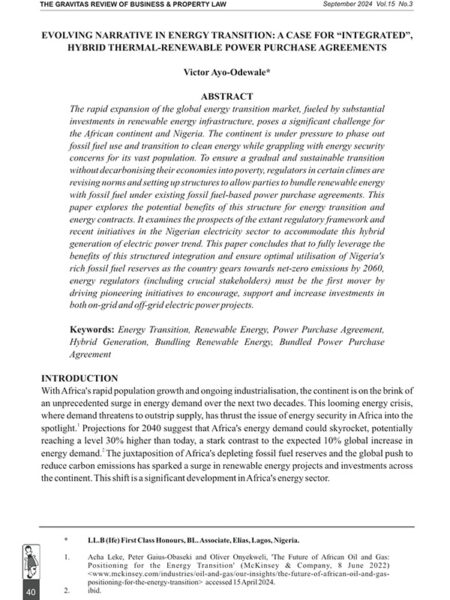
Evolving Narrative in Energy Transition – A Case for “Integrated”, Hybrid Thermal-Renewable Power Purchase Agreements
0₦2,500.00Victor Ayo-Odewale in his article, Evolving Narrative in Energy Transition – A Case for Integrated, Hybrid Thermal-Renewable Power Purchase Agreements, explores the implications of this structure for energy transition and energy contracts. Ayo-Odewale examines the prospects of the extant regulatory framework and recent initiatives in the Nigerian electricity sector to accommodate this hybrid generation of electric power trend. The rapid expansion of the global energy transition market backed by massive investment in renewable energy infrastructure presents a significant challenge for the African continent and, indeed, Nigeria. The continent is under pressure to phase out fossil fuel use and transition to clean energy while it continues to grapple with energy security concerns for its vast population. To ensure a gradual and sustainable transition without decarbonizing their economies into poverty, regulators in certain climes are revising norms and setting up structures to allow parties to bundle renewable energy with fossil fuel under existing fossil fuel-based power purchase agreements. Ayo-Odewale concludes that to fully leverage the benefits of this structured integration and ensure optimal utilization of Nigeria’s rich fossil fuel reserves as the country gears towards net-zero emissions by 2060, energy regulators (including key stakeholders) must be the first mover by driving pioneering initiatives to encourage, support and increase investments in both on-grid and off-grid electric power projects.
-
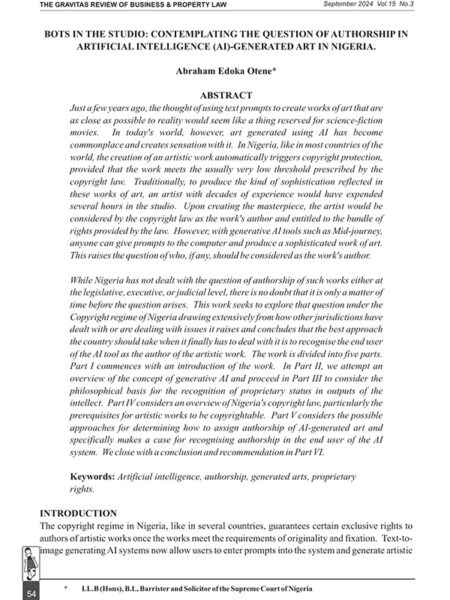
Bots in the Studio: Contemplating the Question of Authorship in Artificial Intelligence (AI)-Generated Art in Nigeria
0₦2,500.00Abraham Edoka Otene in his article, Bots in the Studio: Contemplating the Question of Authorship in Artificial Intelligence (AI)-Generated Art in Nigeria, explores the authorship of AI generated works under the Copyright regime of Nigeria drawing extensively from how other jurisdictions have dealt with or are dealing with issues it raises and concludes that the best approach the country should take when it finally has to deal with it is to recognize the end user of the AI tool as the author of the artistic work. Just a few years ago, the thought of using text prompts to create works of art that are as close as possible to reality would seem like a thing reserved for science-fiction movies. In today’s world, however, art generated using AI has not only become commonplace but is also creating sensation with it. While Nigeria has not dealt with the question of authorship of such works either at the legislative, executive, or judicial level, there is no doubt that it is only a matter of time before the question arises.
-
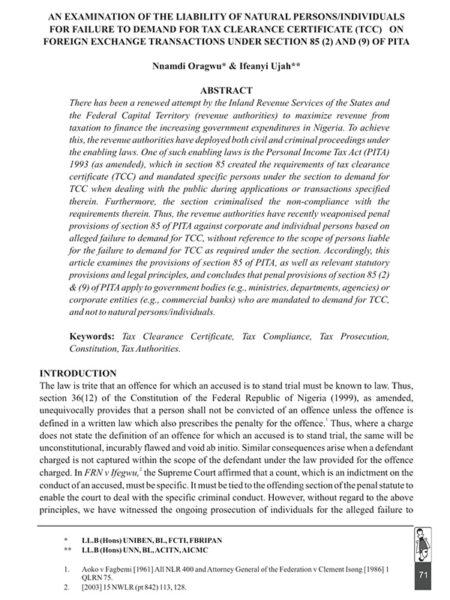
An Examination of the Liability of Natural Persons/Individuals for Failure to Demand for Tax Clearance Certificate (TCC) on Foreign Exchange Transactions under Section 85 (2) and (9) of PITA
0₦2,500.00Nnamdi Oragwu, Esq and Ifeanyi Ujah, Esq, in their article, An Examination of the Liability of Natural Persons/Individuals for Failure to Demand for Tax Clearance Certificate (TCC) on Foreign Exchange Transactions under Section 85 (2) and (9) of PITA, examine the provisions of section 85 of PITA, as well as relevant statutory provisions and legal principles, and concludes that penal provisions of section 85 (2) & (9) of PITA apply to government bodies or corporate entities who are mandated to demand for TCC, and not to natural persons/individuals. There has been a renewed attempt by the Inland Revenue Services of the States and the Federal Capital Territory (revenue authorities) to maximize revenue from taxation to finance the increasing government expenditures in Nigeria. To achieve this, the revenue authorities have deployed both civil and criminal proceedings under the enabling laws. One of such enabling laws is the Personal Income Tax Act (PITA) 1993 (as amended), which in section 85 created the requirements of tax clearance certificate (TCC) and mandated specific persons under the section to demand for TCC when dealing with the public during applications or transactions specified therein.
-
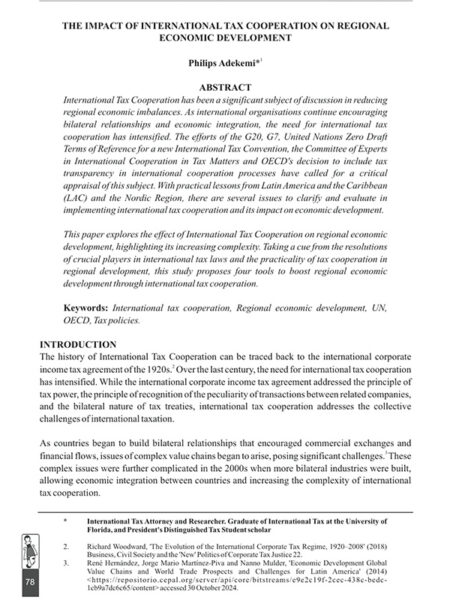
The Impact of International Tax Cooperation on Regional Economic Development
0₦2,500.00Philips Adekemi, in his article The Impact of International Tax Cooperation on Regional Economic Development, explores the effect of International Tax Cooperation on regional economic development, highlighting the increasing complexity of international tax cooperation. International Tax Cooperation has been a major subject of discussion in reducing regional economic imbalances. As international organizations continue to encourage bilateral relationships and economic integration, the need for international tax cooperation has intensified. The efforts of the G20, G7, United Nations Zero Draft Terms of Reference for a new International Tax Convention, the Committee of Experts in International Cooperation in Tax Matters and OECD’s decision to include tax transparency in international cooperation processes have called for a critical appraisal of this subject. With practical lessons from Latin America and the Caribbean (LAC) and the Nordic Region, Adeyemi examines the several issues for clarification and evaluation in the implementation of international tax cooperation and its impact on economic development. Taking a cue from the resolutions of key players in international tax laws and the practicality of tax cooperation in regional development, Adekemi proposes four tools to boost regional economic development through international tax cooperation.
-

Aggressive Tax Avoidance Scheme: The Emergence of the Continuous Distortion of the Fine Line Between Tax Avoidance and Tax Evasion
0₦2,500.00Isaiah Akano in his article, Aggressive Tax Avoidance Scheme: The Emergence of the Continuous Distortion of the Fine Line Between Tax Avoidance and Tax Evasion, explores the thin line between Tax Avoidance and Tax Evasion. Tax is one of the major sources of revenue of the government in Nigeria. As a matter of fact, at the inception of the year 2024, the Federal Government tasked the Federal Inland Revenue Service to generate a whopping sum of N19.4 trillion which amounts to about sixty percent increase from the sum of N12.3 trillion generated by it in 2023 in a bid to raise the overall government revenue as a percentage of the Gross Domestic Product (GDP) to 25% . The revenues are meant to be generated from individuals, companies and other legal entities through tax. Hence, there is a need for citizens and corporate bodies to arrange their affairs in such a way that they can attract a minimal tax, especially in view of the harsh economic condition in the country, high inflation rate, the weak value of the naira and high interest rate on loans which most businesses resorted to, as their major source of capital. Tax lawyers, Accountants and other tax consultants had at different times proffered different ‘tax avoidance schemes’ to their clients. Some of the Schemes are aggressive and complex in nature and there are instances wherein they were eventually interpreted by the Court to amounting to tax evasion. Akano seeks to take a critical look at the line of differences between tax avoidance and tax evasion and also discuss the continuous distortion of same as a result of the advent of aggressive tax avoidance schemes in recent years.
-

A “Deeper Dive”: The New Deduction of Tax at Source (Withholding) Regulations, 2024
0₦2,500.00Stephen Arubike and Adeyinka Adeoye in their article, A “Deeper Dive”: The New Deduction of Tax at Source (Withholding) Regulations, 2024, provide a comprehensive analysis of the Deduction of Tax at Source (Withholding) Regulations, 2024 (the “Regulations”), issued by Nigeria’s Minister of Finance and the Coordinating Minister of the Economy. Effective from January 1, 2025, the Regulations replace previous regulations on the subject, introduce several significant changes to the country’s withholding tax (WHT) regime. Key provisions include adjustments to applicable tax rates, expanded coverage of taxable entities, and a new emphasis on taxpayer identification numbers (TINs) to drive compliance. Arubike and Adeoye also address critical legal concerns raised by the Regulations, including conflicts with primary statutes, overreach in the Minister’s authority, and the unfair imposition of penalties on non-resident companies. While the Regulations aim to simplify WHT processes, reduce tax burdens on small businesses, and enhance tax compliance, several ambiguities and issues remain, particularly regarding non-resident taxation and penalties for non-compliance. Arubike and Adeoye conclude by discussing the transition period and its potential implications, as well as the need for further clarification on certain provisions to ensure fairness and legal consistency in implementing the Regulations.
-

Value Added Tax on Real Estate Lease Transactions: Connecting the Dots
0₦2,500.00In their article, Value Added Tax on Real Estate Lease Transactions: Connecting the Dots, Stephen Arubike and Utonwa Onwumelu tackle the application of Value Added Tax (VAT) to real estate lease transactions. Whilst VAT payment in Nigeria is limited to supplies of either “goods” or “services”, the law only exempts from VAT “goods” or “services” that are explicitly listed in the statute. The failure to define the terms “goods” or “services” prior to 2019 led to the conclusion in some judicial decisions that lease transactions are subject to VAT because neither lease nor interest in land is explicitly exempt from VAT. Arubike and Onwumelu aim to explore the historical context of ‘the absence of precise definition’ controversy, the rationale behind judicial interpretations, the impact of the Finance Acts 2019, 2020 and 2023 in resolving these definition issues and their practical implications.
The Gravitas Review of Business & Property Law
